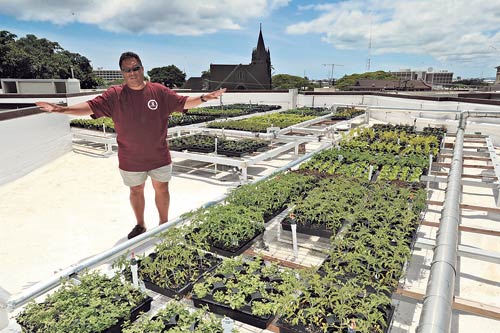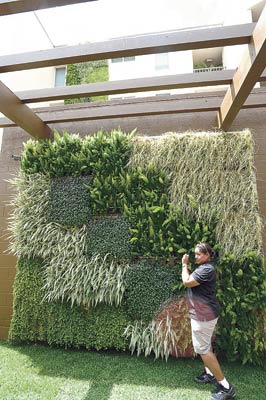Organic vegetables and herbs grow on the roof alongside photovoltaic and solar water heating panels. Kitchen and bathroom countertops are solid granite. Closed-circuit TV monitors children playing on a shaded and grassy "tot lot."
Sound like a nice place to live?
Welcome to the low-income rental apartment building Banyan Street Manor in Palama where average rent is $384 a month.
The amenities in this four-story complex were added in the past year after private developer Vitus Group bought the nearly 40-year-old building from the state.
"It’s beautiful," said Henry Kealoha, a 75-year-old who lives mostly on Social Security at the Banyan. "It’s a big change — right in front of you. It was like magic."
Kealoha has lived at the complex, about a block mauka of Tamashiro Market, for 15 years, and the recent improvements have been uplifting and stunning.
Before the privatization and renovation, a quarter of the Banyan’s 55 one- and two-bedroom apartments were uninhabitable because they weren’t properly maintained. In some cases, interior parts of some apartments were cannibalized for use in other state affordable housing projects. During the last fiscal year of state ownership, costs outstripped income from the Banyan by about $360,000.
Today, the Banyan is fully occupied and there’s a waiting list of people interested in living there. Rents are unchanged. And numerous upgrades were added.
Among renovations made to apartment interiors were new flooring, appliances, cabinets, countertops, lighting, window shades, doors, bathtubs and paint.
Improvements for the building included electrical upgrades, the solar water and photovoltaic panels, new plumbing, a new elevator, paint and security gates and cameras.
Landscaping was added not only on the grounds but also on strips down the sides of the building where colorful plants create mosaic-like wall accents.
"It’s not what you think of for affordable housing," said Makani Maeva, director of the local office of Seattle-based Vitus.
The "tot lot" was made from what was once a loading zone by adding a gate, artificial grass and a basketball hoop. Part of a wall was converted to a chalkboard. Another section serves as a screen for showing movies.
The rooftop garden is being operated by 1st Look Exteriors, which is growing a variety of foods — including tomatoes, lettuce, peppers, eggplant, basil, green beans and strawberries — in raised organic beds. The company will sell 60 percent of harvest to Whole Foods Market and Foodland. The rest will go to Banyan residents for free.
Daniel Ham has lived at the Banyan for 32 years, and he says he now is proud to call it home. "I love the new improvements," he said in a statement.
Project officials and government leaders are holding a blessing and rededication ceremony at the building today, celebrating completion of the overhaul and touting it as a potential model for rehabilitating other dilapidated affordable housing projects owned by the state and city.
"This project is a perfect example of what’s possible when private and public agencies work together to revitalize our communities," Maeva said.
The Hawaii Public Housing Authority had owned the Banyan, which was built in 1976 on city land.
Because of difficulty operating the project even with Section 8 rental subsidies provided by the U.S. Department of Housing and Urban Development, the Housing Authority decided in 2009 to sell the building.
Vitus was selected as the buyer, paying $8.5 million. Renovations cost another $3.1 million.
As part of the deal, the city keeps ownership of the land. Vitus, for 61 years, will keep rents affordable for tenants earning no more than 50 percent of Honolulu’s annual median income, which equates to $41,200 for two people.
HUD committed to providing Section 8 assistance payments to Vitus for 20 years as a way to help limit rent to no more than 30 percent of tenant incomes.
Monthly rent, which ranges from nothing to $1,283, isn’t increasing under Vitus ownership. In fact, Maeva said electricity costs are going to decrease because of the photovoltaic and solar water heating systems.
"The result of this partnership is the preservation of affordable apartments in Oahu’s tight housing market," she said.
Vitus is pursuing other purchases of affordable housing in Hawaii from the city, state and private owners with a goal of improving the properties and a sense of pride and community among residents.
The firm bought its first Hawaii property, Kekaha Plantation Elderly Housing on Kauai, in 2005.
That was followed by Whitmore Circle Apartments in Wahiawa.
Vitus is also a partner with New Jersey-based Michaels Development Co. on the $135 million renovation of the state’s largest public housing project, Kuhio Park Terrace and Kuhio Park Homes.






